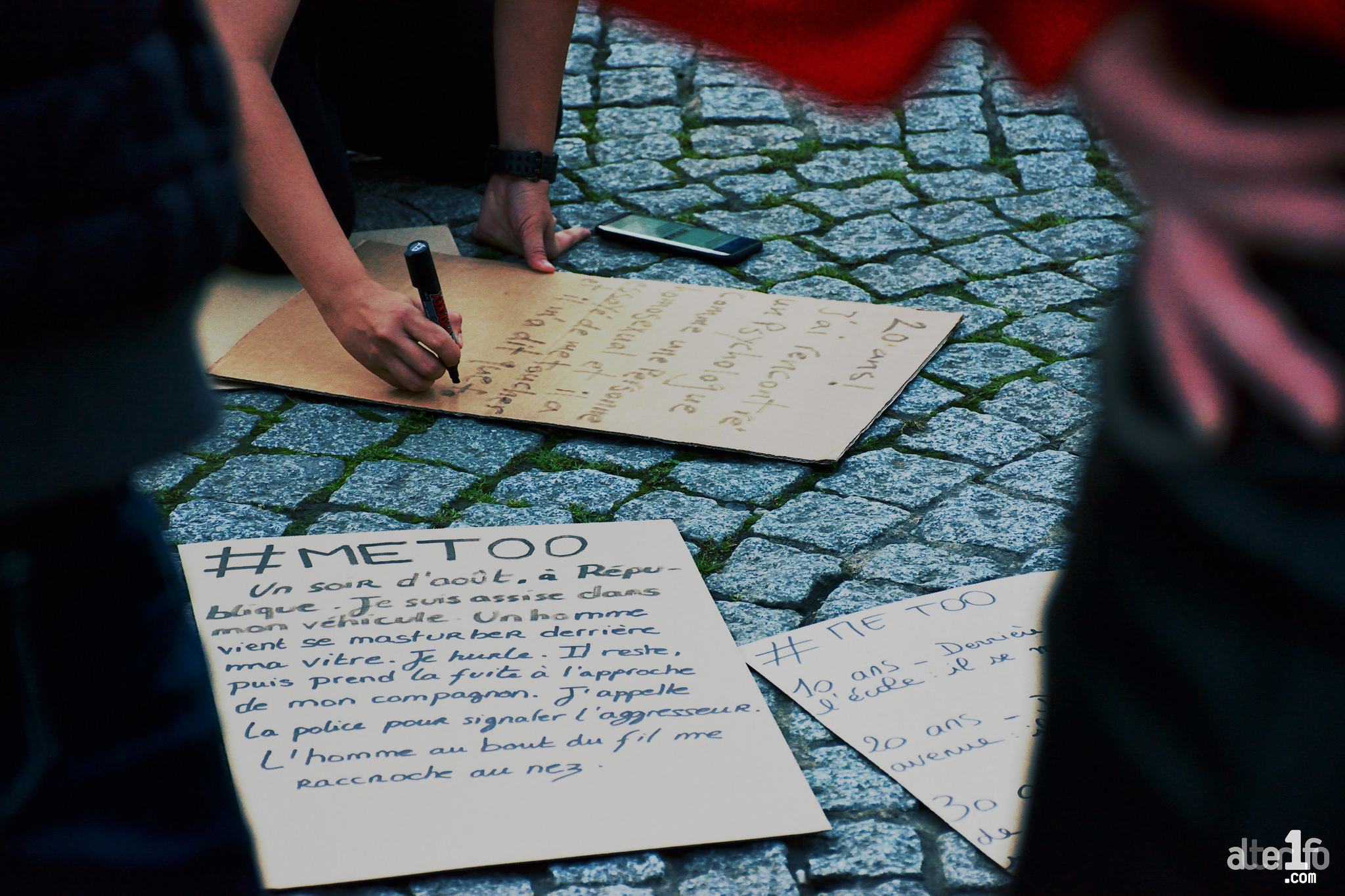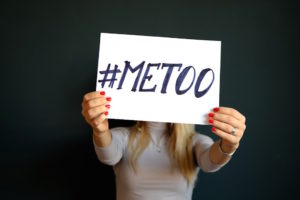It’s the Patriarchy, Stupid
Over and over, men like Harvey Weinstein and Matt Damon miss the larger point about the #MeToo movement. Alter1fo / CC BY-NC-ND 2.0
Alter1fo / CC BY-NC-ND 2.0
No, I have not been shocked by the recent outpouring of sexual harassment allegations that have been making powerful men fall from grace like dominoes in Hollywood, politics, media and more. As a woman I learned early on that sexual harassment was part and parcel of navigating this life in a female body. We have all racked up our stories, our mothers’, our friends’, our heroes’—links on a horrible chain of abuse that takes on many forms. For a humorous and brilliant illustration of a “day in [women’s] fun world,” watch the following “Daily Show” clip featuring Jessica Williams.
What has been surprising, and indeed heartening, however, is to see countless women not only come forward with painful details about their experiences, but seeing them being counted at last. Who knows if it was watching a known sexual predator take office as our 45th president that finally put American society over an edge where people were willing not just to listen but to believe women’s accounts.I know that when the audio of Donald Trump saying his fame allowed him to “grab [women] by the pussy” and women took to Twitter to share examples of similar things happening to them, a memory was triggered of when a total stranger walking past me did what the current president boasted of. Reading tweet after tweet was the first time I was able to identify that incident as assault. This is part of the power of online movements like #YesAllWomen, #MeToo and others: They dispel systemic myths all women have internalized on some level and help us identify the experiences we’ve buried, mislabeled or ignored in order to keep moving.
The biggest scandal to date, and the one that seems to have had the biggest impact on the current conversation, is that surrounding Harvey Weinstein. The Hollywood producer has been accused by over 80 women of sexual abuse ranging from verbal harassment to rape.
Salma Hayek is the most recent woman to discuss her dealings with Weinstein in a gut-wrenching op-ed published recently in The New York Times. In her piece, Hayek details how the producer used his considerable influence to bully her, and he made sexual propositions to her on several occasions. And just as the last time a woman of color spoke out against him, Weinstein issued a rambling, patronizing statement denying the claims.
But this moment is not just about Weinstein, or Louis C.K., or Roy Moore, or Kevin Spacey, or Al Franken, or Charlie Rose, or even Donald Trump; it’s about a society finally beginning to come to terms with toxic masculinity. There is a reason why the silence breakers and the men they’ve accused span the political and professional spectrum of this nation. Anyone who takes an honest moment to analyze the thread woven throughout the stories will quickly note that the harassers in question are all men (with one known exception). And sure, at the moment we’re mostly talking about men in power, but they’re not the only ones.
Men like actor Matt Damon, who recently incited outrage with tone-deaf comments about how not all men are abusers and that there is a “spectrum” of abusive behavior, are once again missing the point. Putting aside Damon’s attachment to Casey Affleck, who has been accused of sexual assault, citing a “spectrum” of sexual violence is to deny the putrid, systemic thread being called attention to. Here are a few responses to the actor’s comments that eloquently get to the heart of the matter:
While sexual harassment might not have the immediate, dreadful, traumatizing aftermath of rape, make no mistake, it is a form of sexual violence that in the end can derail a victim’s life just as surely as rape.
— Rape Crisis Center (@RapeCrisisCent) December 15, 2017
Sexual harassment, misconduct, assault and violence is a systemic disease. The tumor is being cut out right now with no anesthesia. Please send flowers. #MeToo
— Alyssa Milano (@Alyssa_Milano) December 16, 2017
And for another humorous but on-point explanation of “mansplaining” and microagressions, Damon should watch the following clip from the remake of the Norman Lear TV series “One Day at a Time.”
And while we’re on the subject, let’s debunk the myth that accusers are making up allegations. For one, the sheer numbers of women breaking the silence, at great personal risk, should be enough to refute any comments about opportunism.
But there are other numbers everyone would do well to memorize: According to a report published by the National Sexual Violence Resource Center, while, for the most part, research on false reporting of sexual assaults is “unreliable because of inconsistencies with definitions and methods employed to evaluate data,” false allegations make up only about 2 percent to 10 percent of cases. Not to mention that many cases go unreported for reasons including victim shaming and the psychological damage caused by assault.
As AlterNet’s Kali Holloway points out, toxic masculinity is hurting not only women, but men too.
Every time feminists talk about toxic masculinity, there is a chorus of whiny dudes who will immediately assume—or pretend to assume—that feminists are condemning all masculinity, even though the modifier “toxic” inherently suggests that there are forms of masculinity that are not toxic.
So, to be excruciatingly clear, toxic masculinity is a specific model of manhood, geared toward dominance and control. It’s manhood that views women and LGBT people as inferior, sees sex as an act not of affection but of domination, and which valorizes violence as the way to prove one’s self to the world.
… If toxic masculinity was just about men posturing around each other in a comical fashion, that would be one thing, but this persistent pressure to constantly be proving manhood and warding off anything considered feminine or emasculating is the main reason why we have so many damn shootings in the United States.
Whether it’s Islamic terrorism or Columbine-style shootings or, as is the case with some of the most common but least covered mass shootings, an act of domestic violence by a man who would rather kill his family than lose control, the common theme is this toxic masculinity, a desire on the part of the shooter to show off how much power and control he has, to take male dominance to the level of exerting control over life and death itself.
Toxic masculinity is also the reason it’s so easy for men with major issues to get a hold of the high-powered weaponry necessary to commit these crimes. Sure, the pro-gun movement likes to roll out a bunch of half-baked pseudo-arguments pretending at rationality to justify the lack of gun control in this country, but really, the emotional selling point of guns is that they feed the cult of toxic masculinity. Being able to stockpile weapons and have ever bigger and scarier-looking guns is straightforward and undeniable overcompensation for insecure men, who are trying to prove what manly men they are.
In other words, to correct a phrase popularized by another U.S. leader who was accused on multiple occasions of sexual harassment, “It’s the [patriarchy], stupid.” Until we can all accept toxic masculinity as the basis for the sexual violence all women endure daily, this conversation isn’t going anywhere.
Your support matters…Independent journalism is under threat and overshadowed by heavily funded mainstream media.
You can help level the playing field. Become a member.
Your tax-deductible contribution keeps us digging beneath the headlines to give you thought-provoking, investigative reporting and analysis that unearths what's really happening- without compromise.
Give today to support our courageous, independent journalists.






You need to be a supporter to comment.
There are currently no responses to this article.
Be the first to respond.